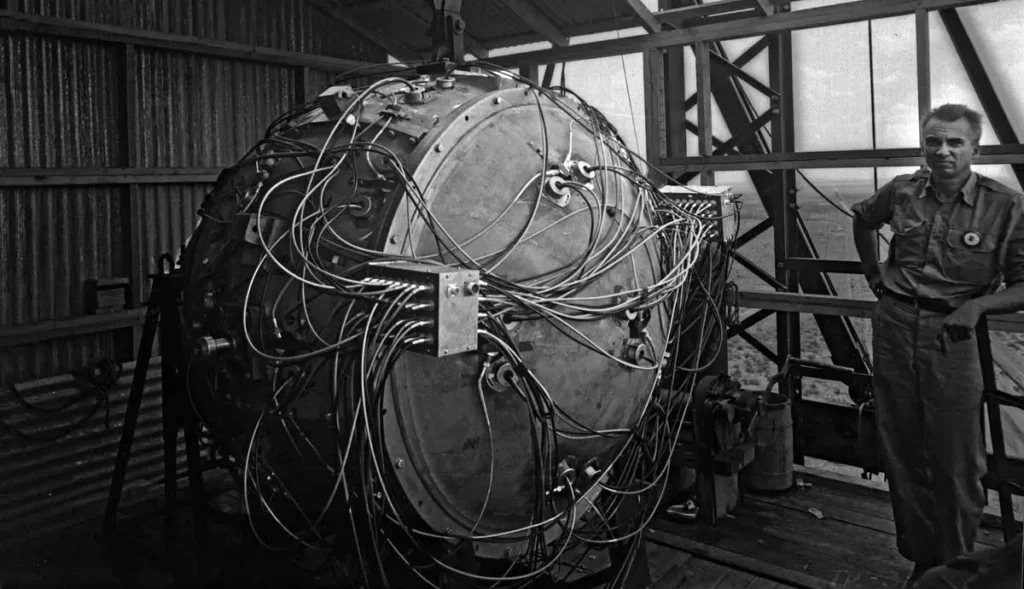The atomic bombings of Hiroshima and Nagasaki stand as two of the most devastating events in human history, marking the culmination of World War II and forever altering the course of warfare and international relations. These bombings are a subject of intense scrutiny and debate, with the central question being: Why did the United States decide to drop two atomic bombs on Japan? To understand the motivations behind this pivotal moment, we must delve into the historical context of World War II and the Pacific Theater.

✅ AI Essay Writer ✅ AI Detector ✅ Plagchecker ✅ Paraphraser
✅ Summarizer ✅ Citation Generator
The Manhattan Project and the Development of Atomic Bombs
The answer to the question lies partly in the Manhattan Project, a top-secret research and development endeavor initiated during World War II. This project was a collective effort by American, British, and Canadian scientists to create the world’s first atomic bombs. The significance of the Manhattan Project cannot be overstated, as it represented a monumental leap in scientific and technological advancements.
At the heart of the project was the development of two types of atomic bombs: one that used uranium-235, known as “Little Boy,” and another that utilized plutonium-239, known as “Fat Man.” The successful creation of these bombs was shrouded in secrecy, and the implications of such powerful weaponry were staggering.
| Possible Reasons | Short Context |
|---|---|
| Hastening Japan’s Surrender | Using the bombs to expedite Japan’s capitulation. |
| Demonstrating Overwhelming Military Power | Showcasing the United States’ superior weaponry. |
| Psychological Impact on Japan | The shock and horror of the bombings influencing Japan’s leadership. |
| Japan’s Response to the Potsdam Declaration | Japan’s non-committal reaction to the ultimatum. |
| Concerns about Soviet Involvement in the Pacific | Worries over Soviet expansion in the region. |
| Strategic Considerations | Factors related to military tactics and the Pacific Theater. |
| Ending the Conflict Swiftly | The desire to conclude the war promptly. |
| Compelling Japan to Unconditional Surrender | Forcing Japan’s surrender without negotiation. |
The Potsdam Declaration and Japanese Surrender
Before the atomic bombings, the Allied leaders, including President Harry S. Truman, British Prime Minister Winston Churchill (later replaced by Clement Attlee), and Soviet Premier Joseph Stalin, convened in Potsdam, Germany, in July 1945 for the Potsdam Conference. During this conference, the leaders issued the Potsdam Declaration, which presented Japan with an ultimatum: surrender unconditionally or face “prompt and utter destruction.”
Japan’s initial response to the Potsdam Declaration was one of ambiguity and non-committal. This response raised concerns among the Allied leaders, especially Truman, who had to consider the implications of a prolonged war in the Pacific. The casualties and resources required for an invasion of the Japanese mainland weighed heavily on the decision-makers.
The Potsdam Conference marked a critical moment in the decision-making process. The ultimatum served as a last diplomatic effort to convince Japan to surrender peacefully. However, Japan’s initial reluctance to comply added uncertainty to the situation. This uncertainty, combined with the desire to end the war swiftly, influenced the subsequent decision to use atomic bombs as a means to force Japan’s surrender, albeit with significant ethical and humanitarian considerations. Ultimately, the Potsdam Conference and the subsequent events underscored the complexities and challenges faced by the Allied leaders during this critical period of World War II.
Psychological and Diplomatic Factors
The psychological impact of the atomic bombings on Japan cannot be underestimated. The devastation unleashed upon Hiroshima and Nagasaki was unprecedented, leading to the loss of tens of thousands of lives and causing immense suffering. The shock and horror of these bombings created a sense of hopelessness within Japan’s leadership, ultimately influencing their decision to surrender.

Diplomacy and negotiations played a pivotal role in the decision-making process. The United States sought to avoid a protracted war in the Pacific and the potential for increased casualties among American forces. By demonstrating their overwhelming military power, they hoped to compel Japan to surrender swiftly.
Moreover, the Soviet Union’s entry into the war against Japan further complicated matters. The U.S. was concerned about Soviet involvement in the Pacific, as it could potentially alter the post-war balance of power and influence in the region. This added a sense of urgency to the decision to use the atomic bombs before the Soviet Union could gain a foothold in Japan.
Controversies and Ethical Considerations
The decision to drop atomic bombs on Hiroshima and Nagasaki remains highly controversial and has raised ethical questions that continue to be debated today. The bombings targeted civilian populations, resulting in the deaths of many innocent civilians. This has led to debates about the morality of such actions, with some arguing that it was a necessary evil to hasten Japan’s surrender, while others condemn it as an inexcusable war crime.
Conclusion
In conclusion, the decision to drop two atomic bombs on Japan was a complex and multifaceted one, influenced by a combination of strategic, psychological, and diplomatic factors. The Manhattan Project’s success in creating atomic bombs offered a powerful tool that was used to compel Japan’s surrender, ultimately ending World War II. However, the ethical questions and controversies surrounding this decision continue to be the subject of intense debate, serving as a sobering reminder of the devastating consequences of nuclear warfare. The bombings of Hiroshima and Nagasaki changed the world forever and remain a critical point in history that demands reflection and analysis.
FAQ
Follow us on Reddit for more insights and updates.





Comments (0)
Welcome to A*Help comments!
We’re all about debate and discussion at A*Help.
We value the diverse opinions of users, so you may find points of view that you don’t agree with. And that’s cool. However, there are certain things we’re not OK with: attempts to manipulate our data in any way, for example, or the posting of discriminative, offensive, hateful, or disparaging material.